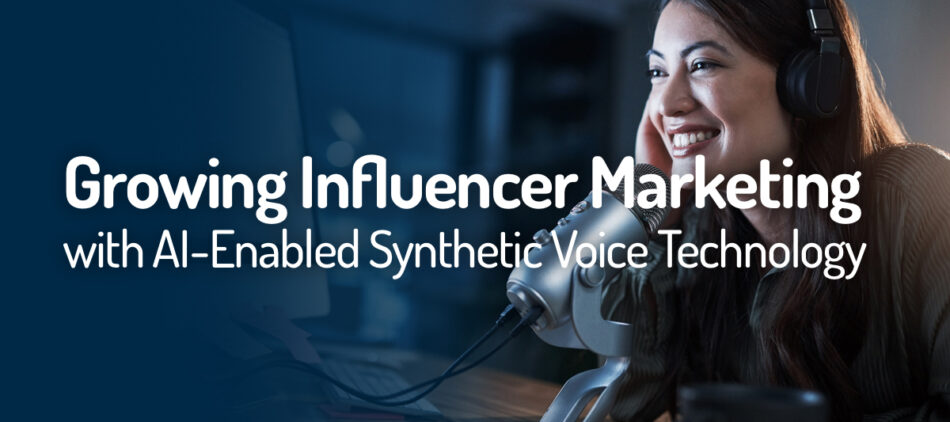
Growing Influencer Marketing with AI-Enabled Synthetic Voice Technology
How Celebrities, Athletes, and Influencers Can Monetize and Protect Their Voices
Summary:
- Influencer marketing makes up one fifth of advertisers’ budgets and shows signs of strong growth
- Both macro and micro-influencers have plenty of revenue opportunities with some the world’s leading brands
- With synthetic voice technology, celebrities, athletes, and influencers can scale their opportunities without having to go into a studio
Influencer marketing is buzzing. According to recent predictions from Advertiser Perceptions, influencer marketing already makes up 20% of digital advertising budgets and is on track to become a $15 billion industry by 2022. When you consider that influencer marketing delivers 11x the ROI of digital marketing, it’s easy to see what the buzz is all about. If you’re a social media influencer, athlete, or celebrity looking to get your share of those billions, synthetic voice technology can help you monetize and protect your voice.
Why influencer marketing works
Advertisers embrace influencer marketing campaigns because they find it builds trust, expands their reach, strengthens their brand messaging, influences consumer buying decisions, and allows them to reach a more engaged and qualified audience. People simply relate better to other people than they do to amorphis brand entities, and that relationship creates an authentic connection that promotes trust — and click-throughs.
For that reason, social media influencers, athletes, and celebrities are in high demand, not just for short endorsement reads, but for longer-form content like video stories as well. And the pay for such gigs can be significant.
In 2021, brands will spend over $1 billion to work with influencers on Instagram alone. Mega-celebrities like Kylie Jenner and the rest of the Kardashian clan are reported to cash in between $250,000 – $500,000 for a single Instagram endorsement. Professional soccer player Cristiano Ronaldo has more than 140 million followers and earns $750,000 per post.
Micro-Influencers have macro influence
We get it — you’re not a Kardashian or a Ronaldo, but that doesn’t mean you can’t attract advertisers. A 2021 Linqia survey found that micro-influencers — those with between 5k and 100k followers — are the most common focus for brand campaigns. In fact, 90% of marketers said that they wanted to work with micro-influencers, up from 80% in 2020. Big brands like La Croix, Spotify, and Adobe frequently rely on micro-influencers to connect with their audiences.
Synthetic voice scales opportunities
As your influencer status grows, you’ll want options to help increase opportunities. While you may not be able to be in two places at once, your voice can be in two or three or more.
Synthetic voice technology allows influencers, athletes, and celebrities to commoditize and monetize their voices. Without the need to spend time in the studio, recording take after take, synthetic voice technology helps replicate one’s voice. But how does it sound versus the real thing?
Synthetic voice technology has advanced well beyond the robotic-sounding technology of the past. Today’s synthetic voice technologies use artificial intelligence (AI) to capture the essential essence of your voice, using training data to create authentic sounding voices.
As a result, you get a productized voice that sounds like you and can be used (with your permission) in a wide range of applications — without you being there. And while you might not be a native Japanese or German speaker, your synthetic voice can pull off convincing and compelling language variations and regional accents.
Preserving and protecting your voice
In the late 1980s, Bruce Springsteen took out a $6 million Lloyds of London policy in case he ever lost or significantly damaged his famous voice. Not to be outdone, Mariah Carey insured her voice for a whopping $35 million should anything go wrong with her vocal cords. And it happens.
Julie Andrews, Run DMC, Adele, Miley Cyrus, and Elton John have all suffered from injuries or illnesses that threatened their iconic voices. Your voice is your instrument — and a valuable asset. Synthetic voice technology is a way to protect and preserve your voice into perpetuity.
As a celebrity, your voice also needs legal protection. Legitimate players in synthetic voice technology understand the licensing and compliance landscape and will work on your behalf to keep your vocal asset safe.
Expanding influencer marketing with synthetic voice
Synthetic voice technology allows celebrities, athletes, and social media influencers to amplify their reach, maximizing the monetization of their voice while retaining the authenticity audiences crave. As the demand for celebrity endorsements and influencer marketing continues to expand, synthetic voice offers a fast, scalable solution to increase their capacity to participate in more opportunities.